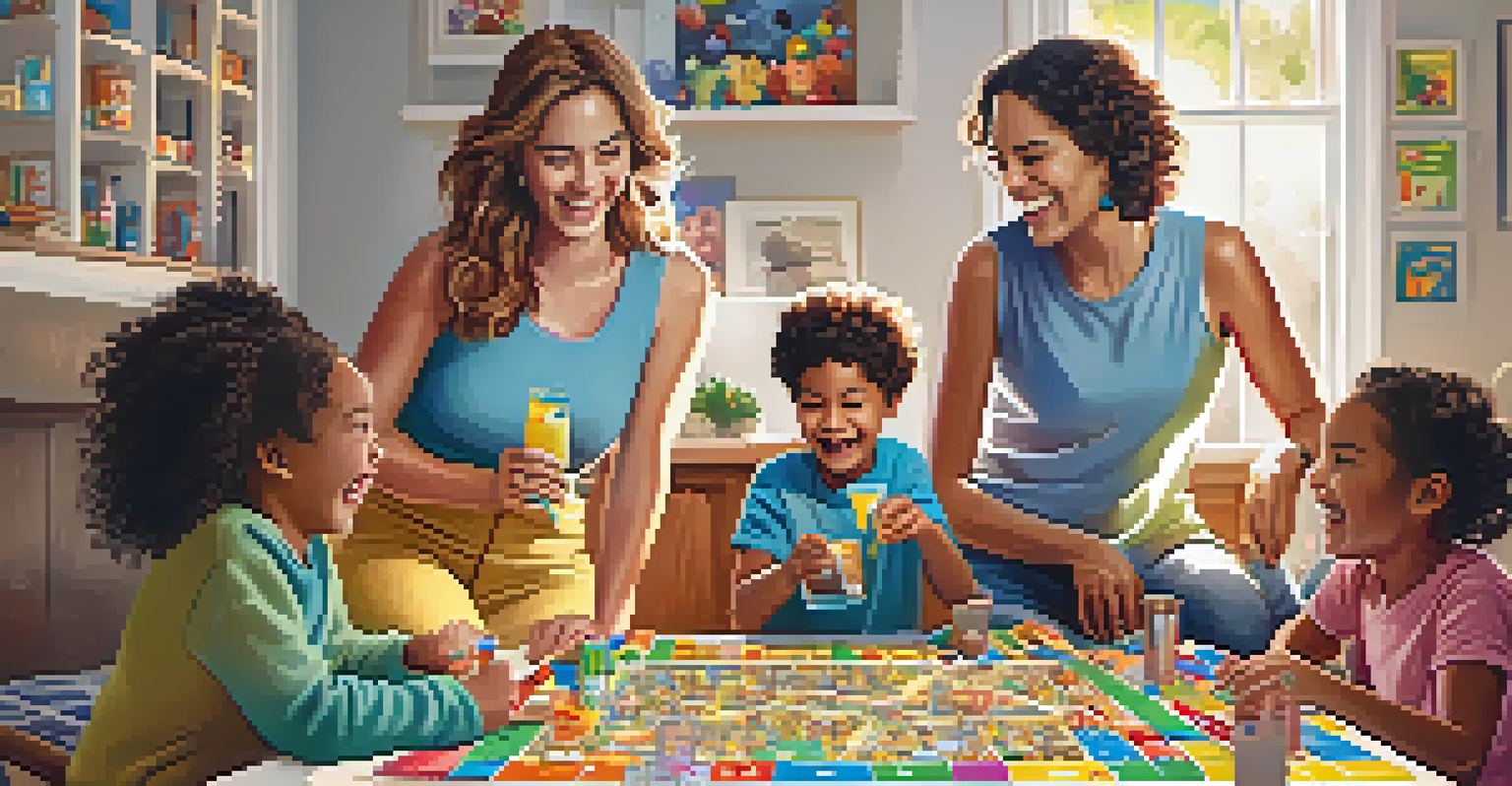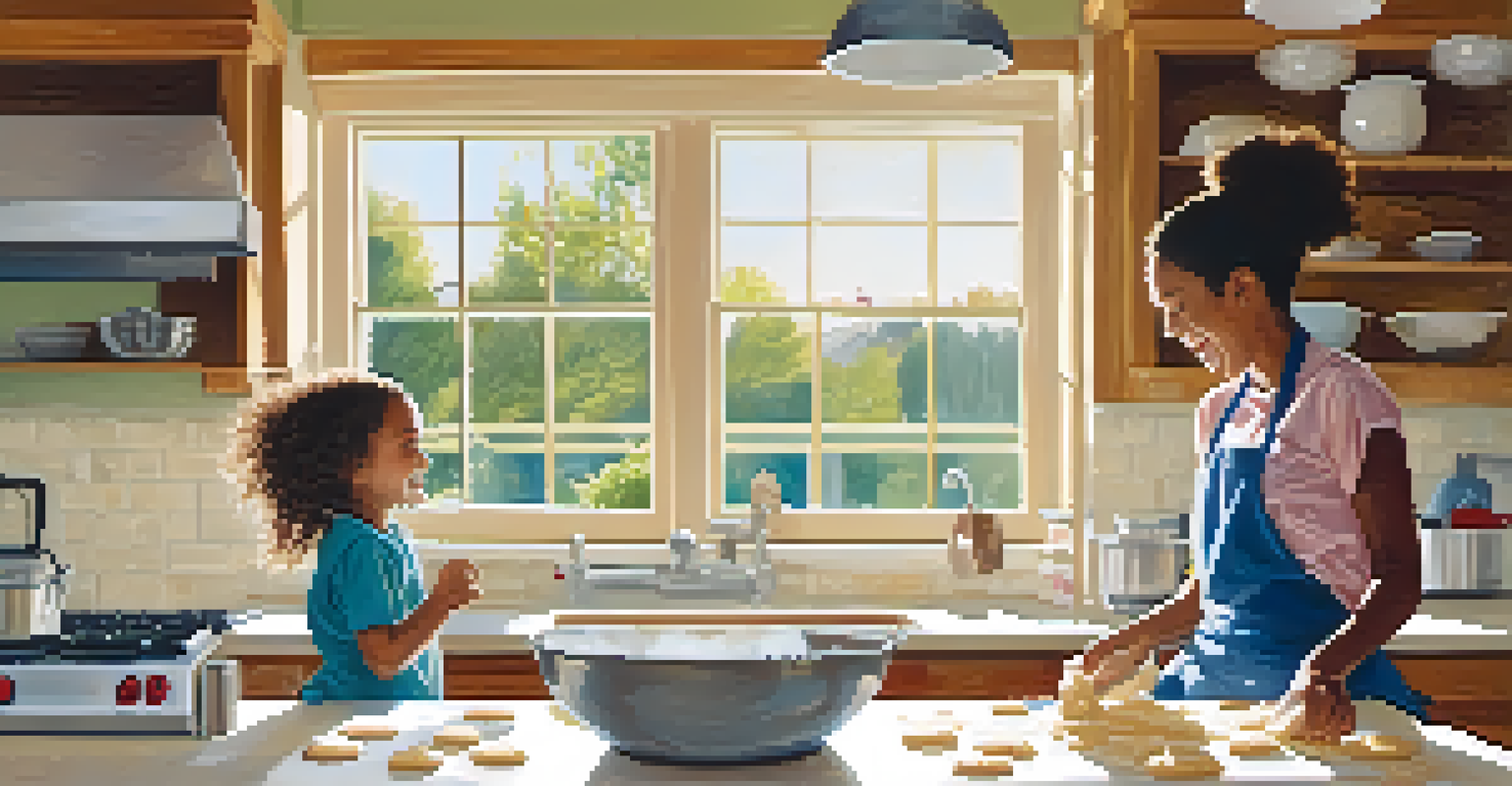The Role of Humor: Strengthening Family Bonds Through Laughter

The Power of Laughter in Family Life
Laughter is often called the best medicine, and when it comes to family life, it truly is. Sharing a laugh can lighten the mood in even the most tense situations, helping to diffuse conflicts and promote understanding. It acts as a bridge, connecting family members and fostering a sense of belonging and togetherness.
Laughter is timeless, imagination has no age, and dreams are forever.
Think about a time when you shared a funny story with your family. The way everyone laughed together created a moment of unity that you all likely cherish. These shared experiences help to solidify relationships, creating a tapestry of memories woven with joy and silliness.
Moreover, laughter has an extraordinary way of making us feel closer to one another. It breaks down barriers and allows us to express ourselves more freely, reinforcing the idea that we are in this journey of life together.
Creating Inside Jokes: A Family Tradition
Inside jokes are unique to each family, often stemming from shared experiences or odd moments that only family members fully understand. These little nuggets of humor can be a source of great joy and connection, allowing family members to reminisce about fun times. They become part of your family’s identity, creating a sense of belonging.

For instance, you might recall a family vacation that went hilariously wrong, leading to a joke about 'never trusting the GPS again.' This shared humor not only brings laughter but also reinforces the bond you share through those experiences.
Laughter Strengthens Family Bonds
Sharing laughter fosters connection and unity among family members, creating cherished memories.
Inside jokes serve as a reminder of your family's unique story. They provide a sense of continuity and tradition that can be passed down through generations, ensuring that laughter remains a core part of your family's culture.
The Role of Playfulness in Family Interactions
Being playful with one another is crucial for fostering a loving family environment. Whether it’s tickling the kids, engaging in goofy games, or playful teasing, these lighthearted interactions help to create a fun atmosphere. Playfulness encourages creativity and spontaneity, making family time enjoyable and memorable.
A family that laughs together stays together.
Imagine a family game night filled with laughter and friendly competition. The playful banter and jokes exchanged during these games not only entertain but also strengthen relationships. This sense of fun often leads to open communication, where family members feel comfortable expressing themselves.
Ultimately, playfulness infuses everyday life with joy, turning mundane moments into cherished memories. It reinforces the idea that family time doesn’t have to be serious; it can be a time to let loose and enjoy each other’s company.
Using Humor to Navigate Challenges Together
Life can throw unexpected challenges at families, from financial stress to health issues. In these tough times, humor can be a powerful coping mechanism. It can help to lighten the mood and provide a fresh perspective, allowing families to face difficulties with a more resilient and united front.
For example, during a stressful home renovation, a family might joke about living in a 'construction zone' and how it resembles a reality TV show. This shared laughter can help to ease tension and make the situation feel less daunting.
Humor Eases Life's Challenges
Using humor during tough times helps families cope better and reinforces emotional resilience.
By using humor to navigate challenges, families can build emotional resilience. Laughter becomes a tool that helps family members support each other, reminding them that they can get through anything together.
The Impact of Shared Laughter on Mental Health
Laughter has been shown to have numerous benefits for mental health, both individually and as a family unit. It reduces stress hormones, boosts mood, and can even improve overall well-being. When families laugh together, they create a positive environment that contributes to everyone's mental health.
Consider how a simple joke shared during dinner can lighten the atmosphere and bring smiles to everyone’s faces. This positivity can ripple outwards, encouraging each family member to approach challenges with a more optimistic mindset.
By prioritizing humor in family life, you’re not only enhancing relationships but also promoting better mental health for each individual. Shared laughter becomes a vital ingredient in the recipe for a happy family.
Teaching Children the Value of Humor
One of the most significant gifts you can give your children is a sense of humor. Teaching them to find joy in everyday situations and to laugh at themselves fosters resilience and adaptability. Kids who learn to embrace humor often develop better social skills and emotional intelligence.
Imagine a child who can find humor in a minor setback, like spilling juice at the dinner table. Instead of feeling embarrassed, they might laugh it off, which not only helps them move on but also encourages others to do the same.
Cultivating a Culture of Humor
Intentional family activities centered around humor create an environment of joy and connection.
By encouraging children to appreciate humor, you're equipping them with a valuable life skill. This ability to find laughter in life’s ups and downs will serve them well in their relationships as they grow.
Fostering a Family Culture of Humor and Connection
Creating a family culture centered around humor starts with intentionality. Set aside time for family activities that invite laughter, like game nights or movie marathons filled with comedies. By prioritizing these moments, you reinforce the idea that joy and connection are essential parts of family life.
Additionally, encourage open dialogue about funny experiences and share favorite jokes or silly stories. This practice not only cultivates a light-hearted atmosphere but also ensures that humor becomes a regular part of your family interactions.

Ultimately, fostering a culture of humor strengthens family bonds, creating an environment where everyone feels connected and valued. This commitment to laughter can lead to a lifetime of shared joy and resilience.